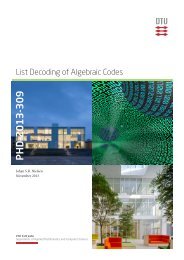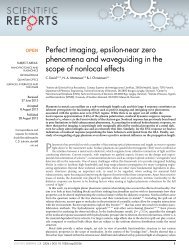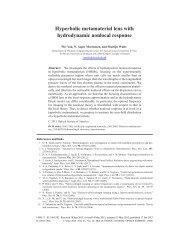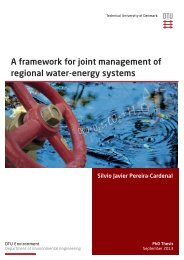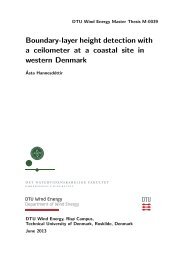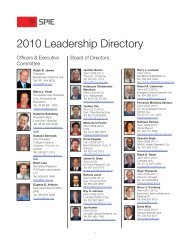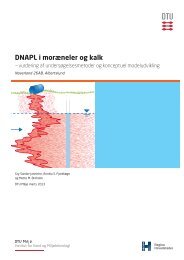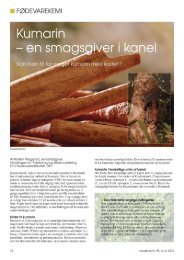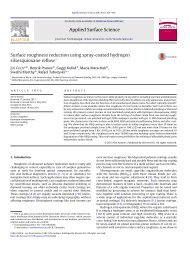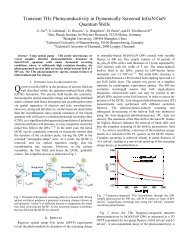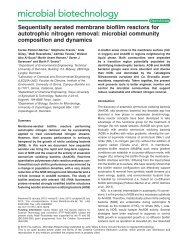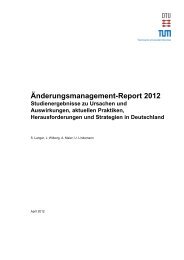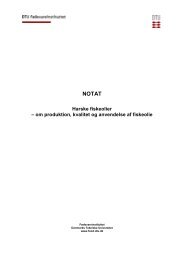PEC12-25 CAPEC-PROCESS Industrial Consortium ... - DTU Orbit
PEC12-25 CAPEC-PROCESS Industrial Consortium ... - DTU Orbit
PEC12-25 CAPEC-PROCESS Industrial Consortium ... - DTU Orbit
You also want an ePaper? Increase the reach of your titles
YUMPU automatically turns print PDFs into web optimized ePapers that Google loves.
Deenesh K. Babi (DKB (DKBabi)<br />
<strong>CAPEC</strong>-<strong>PROCESS</strong><br />
Michele Mattei (MICU)<br />
<strong>CAPEC</strong><br />
Development of a phenomena based approachfor process<br />
intensification<br />
Process intensification (PI) is a means by which process<br />
industries can achieve a more efficient and sustainable chemical<br />
process through the improvement of for example energy<br />
efficiency and waste generation. The objective of this project is<br />
the further development of the phenomena based process<br />
synthesis and design methodology and extension of its<br />
application to entire processes together with the developm development of<br />
a computer framework and computer-aided aided tool for application<br />
of the methodology. The algorithm is part of a larger PI<br />
framework which is being developed as collaboration between<br />
the laboratory of Fluid Separations (FVT), TU TU-Dortmund and<br />
<strong>CAPEC</strong>, <strong>DTU</strong>. This framework will allow the intensification of<br />
processes through the combination of an experimental and<br />
model-based approach.<br />
Supervisors: RaG, JW<br />
Start: 1/8-2012; End: 30-7-2015<br />
Research areas: B, C, E<br />
Development of a systematic methodology for emulsion based<br />
chemical product design<br />
The goal of chemical product design is to find a product that<br />
exhibits a set of desirable or specified behavior. A chemical<br />
product design problem can be summarized as follows: given a<br />
set of desired (target) properties, establish a list of chemical<br />
formulations satisfying these targets and then choose from them<br />
the most appropriate candidate to be veri verified experimentally.<br />
The chemical product of interest can be a single chemical or a<br />
mixture/blend; a formulated product is a mixture that contains<br />
different chemicals, active ingredients as well as additive. The<br />
objective of this project is to develop a systematic methodology<br />
for the design of emulsified chemical products. The<br />
methodology will employ a model model-based product<br />
synthesis/design stage and a model-experiment experiment based further<br />
refinement and/or validation stage. The success of any model-<br />
based methodology depends on the availability of reliable and<br />
predictive models. The project therefore will also develop,<br />
where necessary, the required property prediction models for<br />
emulsions. Design of consumer products will be considered as<br />
suitable case studies.<br />
Supervisors: RaG, GK<br />
Start: 1/8-2012; End: 30-7-2015<br />
Research areas: A, C, F<br />
Kresten T. Meisler (kretm) Multi-dimensional dimensional population balance models of<br />
crystallization processes<br />
The project aims at describing the complex phenomena<br />
occurring during a crystallization operation in multiple<br />
dimensions. The phenomena include nucleation, growth,<br />
34



